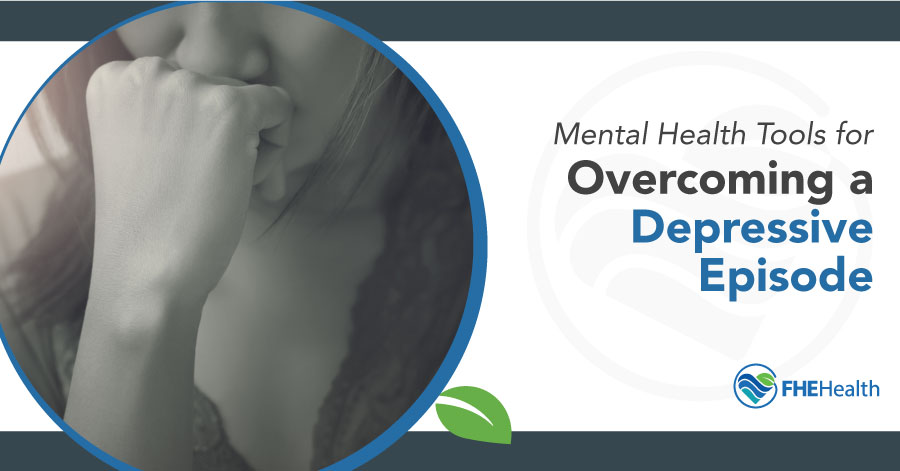
The word “depression” has become highly normalized in modern culture. Saying things like “I feel depressed today” or “today is so depressing” have become colloquial ways to comment on a downward trend in mood or an unfortunate time when things didn’t go according to plan. However, for those living with bipolar disorder or depression, the reality is far more serious.
Clinically diagnosed individuals suffering from major depressive disorder aren’t just occasionally blue; depression can be a serious and life-altering condition. While some days are better than others, depression can cause lasting ramifications on the course of a person’s life.
Depression is always serious, but a major depressive episode can be even more alarming. Characterized by at least two weeks of significant feelings of depression that can’t be alleviated, a depressive episode is often accompanied by a loss of interest in daily activities, lack of appetite and weight loss, extreme fatigue and dark, potentially suicidal thoughts. Those affected by depression recognize these times as far worse than day-to-day living.
This is what you need to know about depressive episodes, and what you can do to ease the burden.
What Is a Depressive Episode?
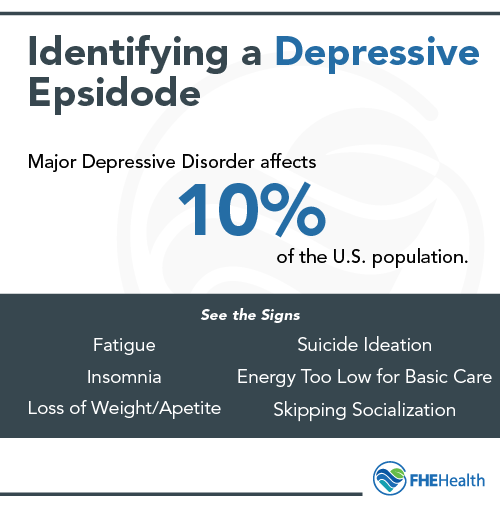 Major depressive disorder is a mental health condition affecting around 10% of the U.S. population. Depressive episodes refer to particularly bad periods that are significantly more intense and debilitating than normal ongoing symptoms of depression.
Major depressive disorder is a mental health condition affecting around 10% of the U.S. population. Depressive episodes refer to particularly bad periods that are significantly more intense and debilitating than normal ongoing symptoms of depression.
During these times, functioning normally can be next to impossible, resulting in consequences to career, school and relationships. Depressive episodes can occur in those with major depressive disorder, the formal name for depression, and bipolar disorder.
While depressive episodes can seem like a natural course of the disease, the serious consequences and the increased likelihood of suicidal ideation makes these periods dangerous. Coping methods and additional help can be imperative to guide individuals through the worst without any lasting side effects that can worsen depression or negatively affect life.
There is no one way in which depressive episodes manifest in those with depression. For some, depressive episodes happen very infrequently, but for others, these episodes can happen on a semi-regular basis.
Seeing the Signs
For those who have experienced depressive episodes in the past, it’s important to recognize the signs to best prepare for future issues. Awareness is the first step to making it through, particularly when seeing the signs gives you the ability to seek additional help, such as therapy or medical intervention.
If you’ve recently experienced a depressive episode, do your best to recall what made you realize things were worse than normal.
- Were you more fatigued than usual?
- Did you have trouble sleeping, even with the use of sleep medications and therapy?
- Did you lose weight due to a lack of appetite?
- Did you skip out on recreational activities such as sporting events, club meetings, or meet-ups with friends?
- Did you neglect professional expectations, like failing to show up for scheduled shifts, skipping classes or missing due dates?
- Did you seriously consider suicide?
- Were your energy levels too low to take care of yourself properly, for example, doing laundry and bathing regularly?
Symptoms can vary, but when things seem out of the ordinary, it’s important to keep trends in mind for future situations. Should any of these warning signs arise, it’s easier to get the help you need.
Coping With Depressive Episodes
If you’re prone to depressive episodes and familiar with triggers, there are things you can do to lessen the symptoms and increase your likelihood of making it to the other side.
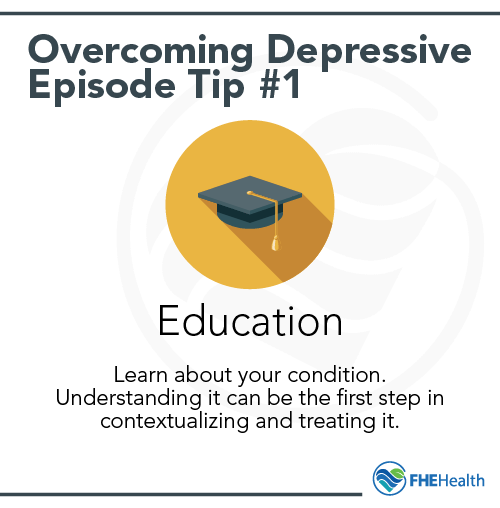 Learn About Your Clinical Condition
Learn About Your Clinical Condition
Even though depression can feel isolating, it’s fairly common, and many of the symptoms are universal, or partially universal. Education can make a big difference in normalizing and contextualizing experiences.
In the moment, it can be hard to process what’s going on, but awareness of symptoms and responses can be critical. When you understand, at least on some level, that what you’re going through is a symptom of your condition rather than a personal failing, it’s easier to take a rational perspective.
There’s no easy way to cope with the symptoms of depression, particularly during depressive episodes, and while knowledge can’t cure a condition, it can help you through the worst moments.
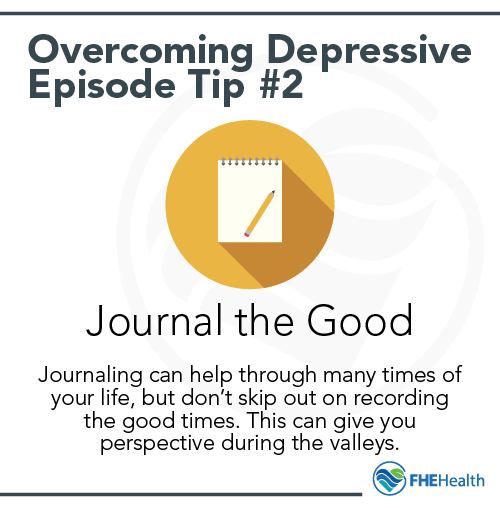 Journal During Good Times
Journal During Good Times
Journaling is a frequent recommendation for those living with depression. It can be hard to make yourself write down anything when you’re lacking motivation or struggling to maintain a normal life, but recording your feelings, particularly the course of ups and downs, can be important in reminding yourself that this too will pass.
When you have moments of happiness or, at minimum, neutrality, it’s critical to document them. The clarity of these thoughts can be a beacon of hope when times get tough.
It’s one thing to read about people living with depression who have a sudden change of heart or who make it out of a downward spiral, but it’s another to read your own words and remind yourself that you were once in a better place. This can give you the strength to persevere, even when things seem at their worst.
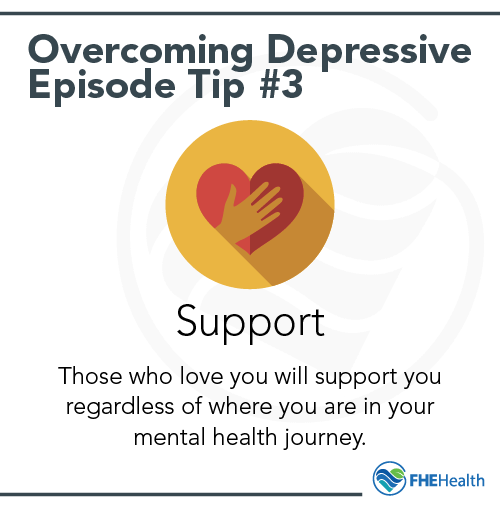 Confide in Friends or Loved Ones
Confide in Friends or Loved Ones
Many people with depression are reluctant to speak to friends and family members out of a combination of shame and a fear of rejection or judgment. But those who love you will support you, no matter where you are in your mental health journey.
Simply saying something to someone, even if it’s just, “I’m feeling worse than usual,” can send a message. Opening up like this can be the first step to admitting your episode and getting the love and care you need to make it through.
Your parents, your partner, your children or your friends may also see signs of a worsening problem. If they reach out to you, do your best to be open and honest.
Get Help
If things are getting worse and there’s no end in sight, professional support can make a difference. Speaking to a therapist, participating in an outpatient program or entering an inpatient program can help alleviate the worst of your symptoms from a mental illness.
Getting help for depression, including more intensive assistance for severe depressive episodes, is a positive step. There’s no shame in speaking to a professional or entering a program. Every step you take is a step in the right direction — a step toward wellness, inside and out.
If you’re living with depression or any other mental health challenge, help is available. Contact FHE Health for additional information to learn more about our comprehensive step-down treatment programs and support groups.









